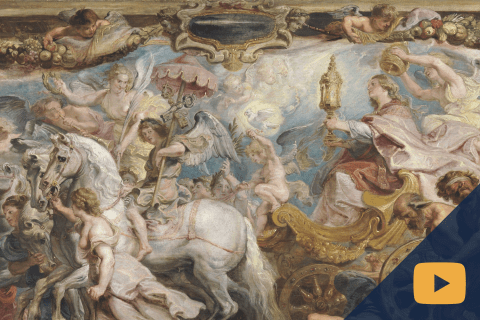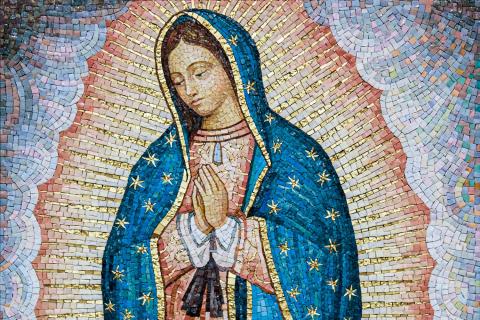
The following text is drawn from "Naming the New Lions: The Challenges of Contemporary Culture to Christian Faith," found in Renewal of Catholic Higher Education: Essays in Catholic Studies in Honor of Don J. Briel, published in 2017 by University of Mary Press. This article will serve as the first in a series of four. Slight alterations have been made to the text.
I would like to begin by drawing attention for a few moments to the celebrated account of Daniel in the Old Testament—the story, that is, of the enormous courage possessed by this young man when faced, all of a sudden, with the threat of the lions’ den. My aim in recalling this story is to raise one question in particular, namely: What are the forces, the oppositions—“the new lions”—that most threaten us today as believers? What are their names? At a time of enormous challenge, when we find ourselves confronted more and more by the culture of death, how can living faith survive and thrive? As you know well, in the Daniel story, of central importance is the remarkable dedication of Daniel to the practice of prayer. But if we consider our own situation today, what possible impact can prayer be expected to make? How can such a humble and simple practice as prayer help us confront the challenge of “the new lions”?
King Darius, according to the biblical account, signed an interdict that no one was to address any petition “to any God or man for thirty days,” otherwise he would be “cast into the den of lions” (Daniel 6:7). Even after Daniel heard that this law had been signed, he continued his custom of going home to kneel in prayer and give thanks to his God in the upper chamber three times a day. However, some of Daniel’s enemies spied on Daniel and reported his disobedience to the king, insisting that Daniel be punished. The king wanted to spare Daniel, but he was bound by the law that he himself had promulgated. And so, with deep regret, he “ordered Daniel to be brought and cast into the den of lions” (Daniel 6:16).
To Daniel the king said: “May your God whom you serve so constantly, save you”…Very early the next morning, the king rose and hastened to the lions’ den. As he drew near he cried out to Daniel sorrowfully: “O Daniel, servant of the living God, has the God whom you serve so constantly been able to save you from the lions?” Daniel answered the king: “O king, live forever! My God has sent his angel and closed the lions’ mouths so that they have not hurt me” (Daniel 6:16; 19-22).
One detail among others that strikes the modern ear as strange in this story is the fact that Daniel was thrown to the lions simply because he said his prayers. But we who are living now—in what we imagine to be a more enlightened age—do we have the right, I wonder, to be so shocked? Not many years ago, in Europe, as it happens, a similar kind of persecution took place, and in an unusually shocking way in Communist Albania. I had the opportunity to visit Albania not long after the final collapse of Communism. (I was giving a retreat, at the time, to some of the sisters of Mother Teresa.) A man I met when I was there, an Albanian, told me a story about his uncle. The Communists were still in power when his uncle became ill and had to go into a hospital, where he underwent a serious operation. After the operation, when he returned to the ward and started to come back to consciousness, he began to groan quietly: “O God, O God!” One of the male nurses in the ward immediately contacted the Communist authorities and told them that, in open violation of state law, a man, a patient, was praying publicly in the ward. The police came at once, and the man was forcibly removed from the hospital. Then, together with all his family who were rounded up by the police, the man was thrown into prison and, in spite of his sickness, held there for many months without trial.
One detail among others that strikes the modern ear as strange in this story is the fact that Daniel was thrown to the lions simply because he said his prayers. But we who are living now—in what we imagine to be a more enlightened age—do we have the right, I wonder, to be so shocked?
The king ordered Daniel to be brought and cast into the lions’ den. In our own day, how are we to understand the significance of this powerful, biblical image? What are the lions of today that threaten us and would devour the body of our faith? Communism is no longer the lion that it once was, so it’s worth asking ourselves the question: Who or what are the new lions now confronting us? I would like to name three. There are other challenges or other threats I could name, which you yourselves would no doubt be able to propose. But the particular trio I have in mind are these: first, the lion of relativism; second, the lion of fundamentalism; and third, the lion of pessimism.
While each of the lions are discussed in greater detail in their own articles, summaries can be given of the lions and the gifts with which we can confront them. The lion of relativism proves a deadly threat because it draws away the lifeblood of strong religious conviction. Unlike other lions that have arisen against the Church, the lion of relativism does not roar but rather presents itself as a tame house cat, disarming us with seemingly innocuous opinions precisely when we should be armed and “strong in faith.” The lion of fundamentalism manifests itself as a sort of sectarian pride and group arrogance. When the faith becomes for us a hard creed or hardline ideology, we become unable to transform the culture in which we live. The lion of fundamentalism is to be confronted with love, which calls us to look beyond ourselves and out to the needs of the world. The lion of pessimism threatens to make us lose heart, falling to fatigue and disenchantment. The only response to this lion is a renewed commitment to Christian hope. Seeds of the faith, even when planted in difficult soil at a difficult hour, contain an extravagant hope. Faith, hope, and love—these are the three gifts we need today if we are to confront the challenges of contemporary society and begin to plant the seeds of a new culture. Without this triune grace we will, inevitably, start to rely too much on other aids—useful in themselves—but offering little or no protection against “the lions.”
With regard to the question of protection from “the lions,” I want in a moment to turn our attention to the question of prayer. But first, permit me to repeat a joke about lions that may well be familiar to you. A man—not a very prayerful man, an atheist, in fact—is being pursued by lions. He runs and runs, but they are fast on his heels. He falls to the ground, covers his face with his hands, and in desperation starts to pray: “O God,” he cries, “if there is a God, help me and change the lions into Christians.” There is a deadly silence. The man thinks: Is it possible my prayer has been answered? He takes his hands away from his eyes just in time to hear one of the lions say: “For what we are about to receive may the Lord make us truly grateful”!
A number of years ago, when I was on retreat on the island of Malta, I came upon an article in a local newspaper written by a young man who had just left the priesthood. His name was Peter. “It never crossed my mind,” Peter wrote, “that I might one day decide to go back on my calling… When I entered into training it was with some very high ideals… The years of training were long and dry and it was my ideals that kept me going… I threw myself into the priesthood… Finally I could start to do what I had studied for all these years… I wanted to do something rather than just talk.”1 By his own account, Peter, as a young priest, almost immediately began to experience opposition and disappointment. “I started to feel I was not being allowed to use my full potential… I decided to opt out. I was suffocating. I felt I no longer had a sense of belonging and I could no longer fulfill my own spirituality.”2
The focus of Peter’s spirituality was all on doing. He never once mentions prayer, and instead of the three gifts that would no doubt have transformed his life, and perhaps saved his vocation—faith, hope, and love—he lists three other things instead, all of them once again focused on doing. “I tried to live my priesthood,” he writes, “with a lot of energy, creativity, and productivity.”3 Three good and useful things in themselves, it has to be said—but these, together with his ideals, were never enough to help Peter make the impact on society that, for so many years in the seminary, he had dreamed of making. His plans to “make a difference,” his ideals for priesthood, his dreams, were all of them, within a few short years, very quickly devoured by the lion of pessimism. What was admirable in young Father Peter was the desire to make some kind of impact on the contemporary world, to Christianize in some way modern culture. But the methods he employed and the spirit in which he approached his task reflected in large part the very world that he wanted to change.
Sometimes, faced with the enormity of the challenge of evangelization today, it happens that those of us who are entrusted with the task in a particular way begin to take ourselves and our own efforts far too seriously. Losing the Gospel sense of our role, we also lose our sense of humor and sense of proportion.
Few people among our contemporaries have made more impact on the modern world than Mother Teresa of Calcutta. I remember a conversation I had with her once at San Gregorio in Rome that relates to our present topic. On that particular day, the convent of San Gregorio, the sisters’ main house in Rome, seemed completely taken over by the media. There were journalists everywhere, and with them all kinds of special lights and cameras and electrical cords and microphones. They wanted Mother Teresa to do an interview, which would form part of a video they hoped to produce and which, they promised her, would go all over the world. These men certainly had “energy” and “creativity” and “productivity.” Mother calmly said, “No, not today, thank you.” As it turned out later, there was very good reason why Mother Teresa should not have participated in this particular project.
The journalists stayed on late into the afternoon, refusing to believe that Mother Teresa would not accede to their request. Finally, after they had gone, I sat down together with Mother on the long gray stone step in the middle of the convent. After a few words of greeting, Mother said: “You know, they don’t understand. Jesus came on earth to bring the most important message of all time to the world. He had only 33 short years in which to do it, and he spent 30 years doing nothing!”
Whatever the full meaning of her words, one thing is clear: When it comes to the question of making an impact on the world or of transforming human culture, God’s ways are not our ways. Sometimes, faced with the enormity of the challenge of evangelization today, it happens that those of us who are entrusted with the task in a particular way begin to take ourselves and our own efforts far too seriously. Losing the Gospel sense of our role, we also lose our sense of humor and sense of proportion. We start to think of all that must be achieved in business terms only, in the language, that is, of human productivity and human success.
Mother Teresa said something on another occasion that relates directly to our topic. It was at Casalina, the sisters’ main house of formation in Rome. I was having breakfast in a small room with another priest, an American, some minutes after having celebrated Mass for the sisters. Mother Teresa joined us, and the conversation turned to the subject of China. I can remember, as if it were yesterday, her reply to one of the priest’s questions—a question innocently couched in the language of big business. He asked: “Mother Teresa, is there any particular group in China that you’re hoping to target?” She replied at once to his question, her words utterly genuine and utterly simple. “My great desire,” she said, “is to meet anybody who has nobody.”
As contemporary believers, whether young or old, we need many things. But first and last, we need faith and hope and love. In prayer—and in prayer more than anywhere else—we receive these gifts. In private prayer, and in the prayer of the Eucharist, we find faith to overcome relativism, love to overcome fundamentalism, and hope to overcome pessimism. In prayer, in the humble earth of our desire for God, seeds are sown for a new culture of life, a new birth, a grace of energy and form, to take root first in our own lives and then to spring up and flourish on the earth. In prayer, faithful prayer, watchful prayer, we meet the God described for us at the close of Chapter Six in the Book of Daniel. Let me read it now to finish: “He is the living God enduring forever; his kingdom shall not be destroyed and his dominion shall be without end. He is a deliverer and saviour, working signs and wonders in heaven and on earth, and he delivered Daniel from the lions’ power.”
1 Cited in Mark Wood, “Poverty, Chastity and Disillusion,” The Malta Independent (March 30, 1997), 18.
2 Ibid.
3 Ibid.

Next: The Lion of Relativism
The lion of relativism wraps itself in seemingly sane and humane wording, hiding its deadly tendency to draw away the lifeblood of strong religious conviction.


